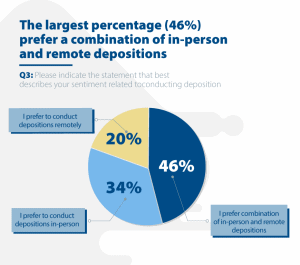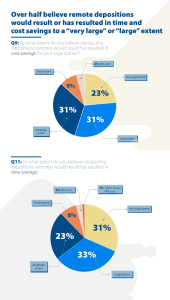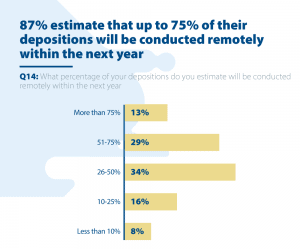Planet Depos conducted a survey over the summer of 2021 to gain more insight into law firms’ attitudes toward remote depositions. Most depositions since March 2020 have been conducted via remote technology, so attorneys are more than familiar with the medium at this stage. Respondents were asked specific questions and given the opportunity to list aspects of remote or in-person depositions which most influenced their opinions for or against that means.
New Perspective – Nearly two thirds of those surveyed (59%) said their perspective on remote depositions has changed. The pandemic and resulting increase in virtual communication made them reconsider remote depositions, with 61% stating they took into consideration the potential benefits remote depositions pass on to clients. These benefits include convenience, and cost and time savings. For example, close to three quarters of respondents (71%) said prior to COVID, they spent up to $20,000 a year on deposition travel. For a third, travel ranked as the second largest deposition expense, after transcript costs. Remote depositions made a big difference in their budgets! Going forward, most attorneys prefer a combination of in-person and remote depos:
Free-Form Considerations – Respondents, when given the opportunity to list pros/cons to remote vs. in-person depositions, provided a thoughtful list.
Those favoring remote depositions emphasized the convenience for all involved. Remote depositions prove to be the best solution for participants with safety concerns amidst the COVID pandemic. Those with elderly clients or clients with serious health issues especially appreciated being able to conduct depositions without jeopardizing their clients’ well-being. Cost and time savings were again mentioned as a primary reason to prefer remote depositions.
Respondents preferring in-person depositions argued that technology can be tricky for older or less technologically savvy clients, making in-person depositions simpler for all parties. It is not uncommon to have clients who cannot access the necessary technology at home, or clients who have but cannot use the technology. Similar concerns were raised regarding the ability to focus on legal terms in a remote deposition, reasoning that it is much easier to focus in an in-person setting. The mechanics of being able to hand the witness a document to physically review was also preferred to sharing a digital exhibit on a screen.
Take-Aways – Attorneys appreciate the benefits of cost and time-savings remote depositions offer them and their clients, and many clients appreciate those advantages as well. There are two sides to every coin, and the long and short of it is that remote depositions are here to stay, and in-person depositions will stick around as well, though remote depositions will be the backbone of discovery for the foreseeable future.
With law firms and their clients growing more comfortable with remote technology, and that technology advancing rapidly, court reporting services are available to enhance the remote deposition. These services make the remote deposition as near to in-person as is possible.
For example, a firm could schedule a certified realtime reporter to provide a near-instant verbatim record, available for streaming to attorneys and their teams. A realtime feed benefits those who find it more difficult to follow a remote deposition. Realtime makes it easy to instantly flag testimony for follow-up, saves time with fewer readbacks by the reporter, and is immensely helpful to an interpreter if applicable. Realtime reporters are in high demand, so attorneys wishing to include this invaluable service should secure a realtime reporter as soon as they schedule.
To up the in-person feel of the remote deposition, schedule a technician. The technician monitors the connection throughout the proceeding, keeping all parties continuously connected. More than that, this skilled professional troubleshoots any issues a connecting party may have, and can handle exhibits, sharing and marking them as a reporter would for an in-person deposition. For anyone with a client who is nervous about a remote deposition, the technician will be a huge help.
Digital exhibits and a secure sharing system simplify the whole exhibit question in remote depositions. Talk to your court reporting agency about a cloud-based service to confidently share exhibits with ease and airtight security. Files should be protected with up to AES 256-bit encryption both in transit and at rest, protecting even highly confidential documents. Files should be accessible to cleared parties from any device. The system makes storage and management of exhibits a snap!
Planet Depos has been covering in-person and remote depositions all over the world for more than a decade. For more helpful tips, check out the Planet Depos blog. To schedule your next proceeding, contact Planet Depos at schedulenow@planetdepos.com, or schedule online.



